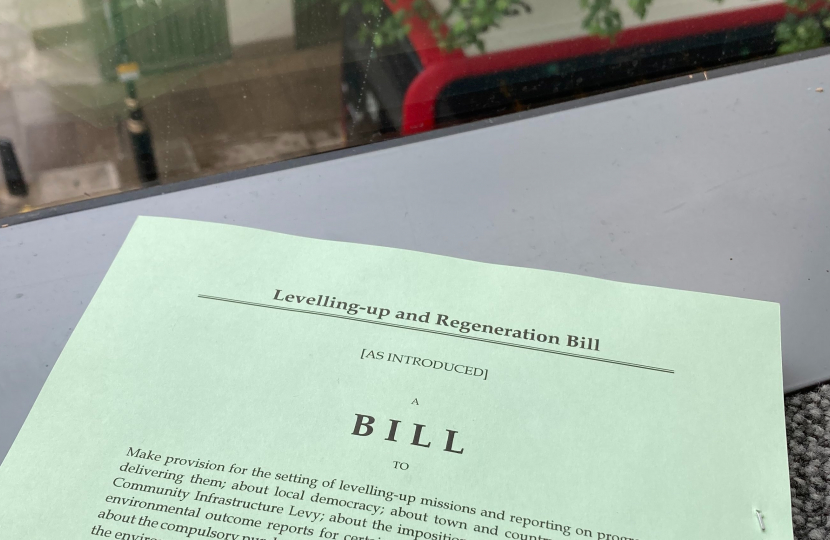
Julian has signed an amendment to the Levelling Up and Regeneration Bill tabled by neighbouring MP Rachael Maskell which would give local authorities the ability to license and therefore control the number of second homes and holiday lets.
This is in response to the rapid rise of AirBnB properties which have added further strain to York’s housing market.
In full, the amendment would legislate for:
(1) The Secretary of State must make regulations to require each relevant local authority in England to introduce a local licensing scheme for holiday lets.
(2) Any local licensing scheme introduced pursuant to regulations made under subsection (1) must require any owner of a holiday let to—
(a) obtain any fire, gas and electricity safety certificates as specified by the scheme;
(b) ensure that the holiday let complies with any health and safety regulations specified by the scheme, including the completion of any risk assessments required by those regulations;
(c) secure a licence for the holiday let from the local authority prior to trading;
(d) obtain a licence and renew this licence—
(i) every three years,
(ii) when the property changes ownership, or
(iii) when there is a change in the person holding day to day responsibility for the property; and
(e) not let out a property without a valid licence.
(3) A local authority introducing a licensing scheme must—
(a) outline—
(i) the terms and conditions of the licence,
(ii) the application process for securing the licence, and
(iii) the licence renewal process;
(b) determine an annual licence fee for each licensed property;
(c) inspect any property prior to issuing a licence;
(d) require the owner of a short term holiday let to—
(i) apply for and hold a licence to operate for each property they let prior to trading,
(ii) pay a licence application fee and annual charge for the licence,
(iii) renew the licence as required by the local authority under their licensing scheme,
(iv) pay any fines associated with breaches of a licence as laid out in the local licensing scheme,
(v) ensure that the holiday let complies with any health and safety regulations specified by the scheme, including the completion of any risk assessments required by those regulations, and
(vi) provide up to date property details including details of who will hold responsibility for the day to day management of the property;
(e) maintain an up to date list of all licensed short term holiday let properties within the local authority area to include—
(i) the address of the property,
(ii) whether this is a shared property occupied by the owner or a separate let,
(iii) how many people are eligible to stay at the property, and
(iv) how many days of the year that the property will be advertised for letting and be let;
(f) inspect the property following a report from the public of an issue of concern relating to the property or to any other property owned by the same person;
(g) monitor compliance with the licensing scheme;
(h) publish an annual report on the number and location of licences including the number and location of licences in each ward and their impact on local residential housing supply and details of any breaches reported and fines issued; and
(i) provide residents adjacent to the short term holiday let contact details of their enforcement officer should they experience any issue at the property.
(4) A licensing scheme must allow the local authority to— (a)set out details of any area where the granting or renewal of licences will be banned, suspended or limited;
(b) set limits and or thresholds on the level of the licencing permitted in any area;
(c) require property owners to renew their licences every three years, or when a property changes in ownership;
(d) issue fines or remove a licence of a property if—
(i) fire, health and safety conditions are breached,
(ii) criminal activity occurs at the property, or
(iii) excess noise and nuisance or anti-social behaviour rules as set out in the licensing conditions are repeatedly breached, or
(iv) the registered owner or the person listed as holding responsibility for the property has had licences on other properties removed; and
(e) issue penalties or licensing bans on those renting properties without a licence.
(5) In this section— an “area” may be—
(a) a polling district;
(b) a ward; or
(c) the whole local authority area;
“holiday let” means—
(a) a dwelling-house let for the purpose of conferring on the tenant the right to occupy the dwelling-house for a holiday, or
(b) any part of a dwelling-house let for the purpose of conferring on the tenant to occupy that part of the house for a holiday;
“relevant local authority” means—
(a) a district council in England;
(b) a county council in England for an area for which there is no district council;
(c) a London borough council;
(d) the Common Council of the City of London.”
Unfortunately, the Speaker did not select Rachael’s amendment to be brought to a vote. This is disappointing but not totally unexpected due to their being 130 pages of amendments. This is not the end of constructive action though as Rachael was fortunate to be drawn high in the ballot of MPs when allocating Private Members’ Bill so she has been able to introduce a Bill which proposes legislation similar to her amendment. It successfully passed its first reading in December and Julian will await its second reading next year.
In an attempt to address local housing supply, North Yorkshire County Council became the country’s first local authority to adopt a mandatory 100 per cent council tax premium for second homes. While the powers to do this have not yet been devolved, it remains ready to be deployed once Government legislation is passed.

